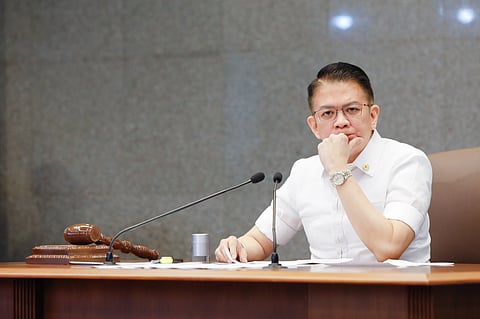
- NEWS
- the EDIT
- COMMENTARY
- BUSINESS
- LIFE
- SHOW
- ACTION
- GLOBAL GOALS
- SNAPS
- DYARYO TIRADA
- MORE

Senate President Francis “Chiz” G. Escudero is calling for a major change in the way the national budget is crafted, urging that local government executives, including governors and city mayors, be included in Senate hearings on the proposed 2026 national expenditure program.
“They have been sidelined for too long. It is now time to give them a seat at the table,” Escudero said, as he formally recommended to Senator Sherwin Gatchalian, chair of the Senate Committee on Finance, to invite local chief executives to actively participate in budget deliberations.
Escudero argued that while department and bureau officials routinely defend their budget proposals before the Senate, local government leaders—who are directly responsible for implementing many of the national government’s programs—have historically been left out of the process.
“Kung mga division heads ng maliliit na bureaus ay dumadalo sa budget hearings, bakit ang mga pinuno ng mga probinsya at malalaking lungsod ay hindi? (If division heads of small bureaus attend the budget hearings, why aren’t the leaders of provinces and major cities allowed to?),” he quipped.
He stressed that governors and mayors are in a unique position to validate whether proposed projects in the national budget truly reflect the needs of communities on the ground.
Their input, Escudero added, could help avoid wasteful spending and prevent the implementation of so-called “white-elephant” projects.
“The perspectives of leaders on the ground are invaluable in determining which projects are necessary and which are not. They can also help flag possible overpricing in the appropriations being requested,” he pointed out.
Escudero criticized what he called the “top-down” culture of budgeting, where projects are often designed and inserted without the knowledge or input of local government units (LGUs), sometimes driven by political motives.
“Teritoryo nila ang mga ito. Kaya sila ang mas makakasagot kung kailangan nga ba talaga. Their feedback is too important to be ignored (These are their territories. That’s why they’re in the best position to say whether these projects are truly necessary. Their feedback is too important to be ignored),” he said.
As a potential safeguard against inefficient spending, Escudero proposed that all development projects be required to secure approval or endorsement from Provincial and Regional Development Councils.
This, he said, would ensure that LGUs are at least informed, if not consulted, about the national government’s proposed programs and activities in their areas.
“One way to achieve this is by requiring the approval or endorsement of the respective Provincial Development Councils and the Regional Development Councils for all development projects so that, at the very least, each LGU will be informed and notified of the proposed programs and activities of the national government in the ensuing year,” he explained.
